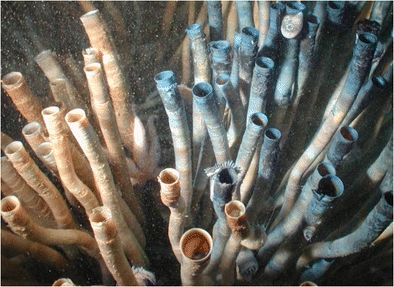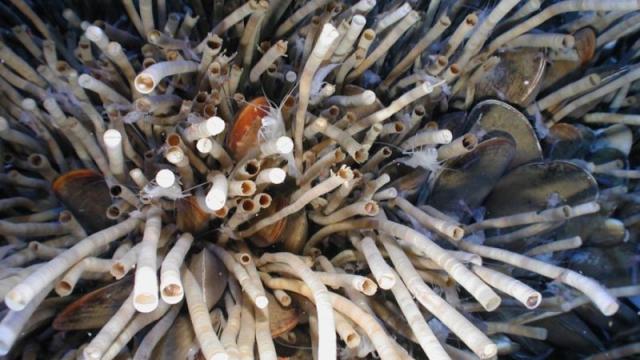Image: The Chemo III project, BOEM and NOAA OER
Things just don’t seem to die in the deep ocean (well, except for humans). While rockfish nearer the surface live about 12 years, those living closer to 2500 feet down can live for 200 years. There’s a deep water coral that can apparently live as long as 4,000 years. But there’s one species that seems to live an especially long time, and could rank up there with the oldest: Escarpia laminata, some dumbass tubeworm.
I think this animal sucks. Other people think that tubeworms are cool because of their alien way of living, surviving via an incredible relationship with special bacteria in nooks of the ocean rich with methane and hydrogen sulfide. A team of researchers estimates that E. laminata could be one of the longest-living animals. There are good animals in the ocean that live for a long time, like tortoises, whales, and even clams. But somehow this contender for the longest-living non-colonial animal (aka, not a bunch of connected animals like coral) is very stupid.
“The animal we study is not stupid,” the researchers from Penn State and Temple University might have told me, should I have asked them. “It is a good animal that lives for a long time,” they would have said. “No, it is dumb and I don’t like it,” I would have replied. This conversation didn’t happen.
So, how did we end up in this position, outlived by a tube instead of a cool animal with teeth or fins or something? Researchers visited and stained blue some populations of the E. laminata worms in the Gulf of Mexico back in 2006, then visited the stained worms a year later. They measured how much the worms grew past the blue dye line — they ended up measuring 356 tubeworms this way. They also collected a whole lot of tubeworms with a “Bushmaster Junior” (seriously) and even visited some old friends they’d measured back in 1992 to take new growth measurements.

The worms, stained and unstained (Image: Durkin et al)
The team measured the rate at which the worms grew and compared them to their total length, building a special model with all of the data points to try and calculate the age. They found a couple of things: First off, these worms don’t seem to die. Only around 0.67% of the population dies annually, according to the study published in The Science of Nature. The researchers also calculated that a 50 centimeter worm (around 51cm) would be about 116 years old, older than other shallower water species of worms of the same size.
Really, these worms can live to be very, very old — their lifespan is probably higher than 250 years, the scientists write. While this is just an estimate, the researchers think some worms might live longer than 500 years.
The real question they had was why, why do these dumb worms live so much longer than similar worm species living in shallower waters (and longer than me). The authors cited some studies that showed that conditions in the deeper ocean could slow down metabolism, and therefore prolong lifespan. E. laminata doesn’t have any predators either, spare some parasites.
I sent the paper to some other researchers, who did not share my dislike for the worms. S. Jay Olshansky, a professor in the School of Public Health at the University of Illinois at Chicago, told Gizmodo in an email that he didn’t feel comfortable commenting on worms specifically, but said that the study was “quite interesting. After all, how do you measure their age if they’re older than you?” He thought their age estimation was quite sophisticated. Plus, “If the authors are correct,” he said, “this does indeed provide further corroboration for the evolutionary theory of senescence suggesting that reproduction and duration of life are calibrated to the level of hostility in the environment.”
And Dominique Cowart, a postdoc at the University of Illinois, Urbana-Champaign who has studied tubeworms, thought it was a “great study.” The findings didn’t surprise her, given the longevity of E. laminata‘s shallower relatives, but showed that age might play a role in increasing the lifespan.
Anyway. Sorry I got mad, and my apologies to the researchers. These worms aren’t really stupid. I’m just mad that they get to live a long time doing nothing at the bottom of the ocean while I only get like, 70-something years to do cool, productive things like play on the computer and eat Cheetos.
